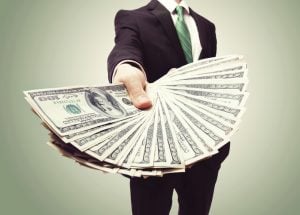
What Do My Campaign Contributions Say About My Politics?
//
 Dean Paul Caron posted on TaxProfBlog some findings from professor Derek Muller about law school faculty campaign donations from 2017 to early 2023.
Dean Paul Caron posted on TaxProfBlog some findings from professor Derek Muller about law school faculty campaign donations from 2017 to early 2023.
The results are stunning. According to Muller, he “identified 3,148 law faculty who contributed only to Democrats in this 5+ year span — 95.9% of the data set of those identified as contributing to either Democrats or Republicans in this period. Another 88 (2.7%) contributed only to Republicans. And 48 others contributed to both Democrats and Republicans.”
googletag.cmd.push( function() { // Display ad. googletag.display( "div-id-for-top-300x250" ); });I have questions, but not about Muller’s method, which I trust. He is careful to discuss that the numbers convey limited information:
 Sponsored Profit Powerhouse: Elevating Law Firm Financial Performance In this CLE-eligible webinar on April 10th, we’ll explore the most common accounting pitfalls and how to avoid them for your firm. From Pilot and Above The Law
Sponsored Profit Powerhouse: Elevating Law Firm Financial Performance In this CLE-eligible webinar on April 10th, we’ll explore the most common accounting pitfalls and how to avoid them for your firm. From Pilot and Above The Law Of course, there are limitations to this study like any others. For some law schools, law faculty were running for office (e.g., former Harvard Law professor Elizabeth Warren running for Senate and for President), and contributions could be skewed to support a colleague. Faculty can “contribute” in other ways, such as volunteering for a campaign or even work in an administration. Faculty might be very “political” in a sense but refuse to contribute to candidates.
He is exactly right! For example, if you look at some school’s campaign donations, you cannot find people you might expect to find. Professor Amy Wax at Penn, for example, either gave to the Democratic Party or did not donate at all at the levels to be in the data at all. The University of Chicago Law School similar appears to only have one Republican and one person who donated to both parties. And Yale appears all Democrat as well, despite vigorous support for a President Donald Trump Supreme Court Justice nominee by one faculty member.
googletag.cmd.push( function() { // Display ad. googletag.display( "div-id-for-middle-300x250" ); }); googletag.cmd.push( function() { // Display ad. googletag.display( "div-id-for-storycontent-440x100" ); }); googletag.cmd.push( function() { // Display ad. googletag.display( "div-id-for-in-story-youtube-1x1" ); });So, I have other questions as to what the results mean. I also worry about how they will be interpreted: In a time in which there is a quest to show universities in general and law schools in particular as woke bastions of liberals and commies, I know this will be used to scream to the heavens about how liberal the legal academy is, and perhaps be used as further attacks on tenure, curriculum, and funding of higher education.
But I’m not sure what I’m seeing is evidence of a bastion of liberals and commies.
Sponsored Sponsored How AI Is The Catalyst For Reshaping Every Aspect Of Legal Work
Sponsored How AI Is The Catalyst For Reshaping Every Aspect Of Legal Work  Sponsored Profit Powerhouse: Elevating Law Firm Financial Performance In this CLE-eligible webinar on April 10th, we’ll explore the most common accounting pitfalls and how to avoid them for your firm. From Pilot and Above The Law
Sponsored Profit Powerhouse: Elevating Law Firm Financial Performance In this CLE-eligible webinar on April 10th, we’ll explore the most common accounting pitfalls and how to avoid them for your firm. From Pilot and Above The Law  Sponsored This AI-Powered Document Tool Will Meet You Where You Are Lexis Create provides simple access to internal and external knowledge — directly within Microsoft Word. From Ethan Beberness
Sponsored This AI-Powered Document Tool Will Meet You Where You Are Lexis Create provides simple access to internal and external knowledge — directly within Microsoft Word. From Ethan Beberness  Sponsored Early Adopters Of Legal AI Gaining Competitive Edge In Marketplace How to best leverage generative AI as an early adopter with ethical use. From LexisNexis
Sponsored Early Adopters Of Legal AI Gaining Competitive Edge In Marketplace How to best leverage generative AI as an early adopter with ethical use. From LexisNexis To start, as professor Milan Markovic points out, the number of professor donors (for the reportable amount minimum) seems like a small number. Most professors do not donate to either party. 3,148 faculty out of the “more than 10,000” boasted in the AALS directory of law teachers. Can we measure something from the lack of donations? Everyone waiting for a Communist Party revolution? Do professors play more in smaller amounts?
And it’s only five years of data, which puts us right in the midst of the “Trump effect.” Are some traditional Republicans donating to Democrats? Were some mildly Democratic donors more likely to go all-in with Democrat donations given Trump? Professor Robert Anderson suggests that the numbers are stable, based upon 2005 work by John O. McGinnis, Matthew A. Schwartz, and Benjamin Tisdell. Are they the same repeat players over time or new players. Does it matter?
Moreover, donations are not necessarily indicative of a professor’s belief system. For one, there may be disparity between the donor’s and the candidate’s ideologies. Imperfect information is a problem in political markets.
googletag.cmd.push( function() { // Display ad. googletag.display( "div-id-for-bottom-300x250" ); });Take, for example, a professor who donated to President Joe Biden solely to eliminate Trump. Some of those professors who donated to Biden a while ago might insist that they won’t vote for him again or will vote for Trump instead in the wake of Gaza. The data only shows the donation, despite the donor’s choice to never vote for Biden again. Repeat with any politician. The donation matters, not the reason for the donation, whether the candidate lied in campaign speeches, possible lies that caused the professor to donate, or any regret the professor has about the donation.
Also, dollar donations do not indicate depth of belief, even if somehow the candidate’s views perfectly matched the donor’s views. The dollar value, in other words, cannot be used to measure any sort of intensity of feeling. Similar arguments for the limitations of the metric of money are prevalent in economic theory.
Sponsored Sponsored Early Adopters Of Legal AI Gaining Competitive Edge In Marketplace How to best leverage generative AI as an early adopter with ethical use. From LexisNexis
Sponsored Early Adopters Of Legal AI Gaining Competitive Edge In Marketplace How to best leverage generative AI as an early adopter with ethical use. From LexisNexis  Sponsored Document Automation For Law Firms: The Definitive Guide
Sponsored Document Automation For Law Firms: The Definitive Guide One potential other question about donations concerns the velocity of donations. Frequent donations or repeat donations might signal something (although I’m not sure what). Would that matter?
Duopoly makes gauging preferences more difficult. To the right is Coke, to the left Pepsi, and we note that few consumers alternate. But such measures don’t reflect the lack of other alternatives. There’s no RC Cola Party. So, to the extent one considers Democrats liberal, it is because there are no other relative positions. Saying something is to the left could mean close by or miles away.
Even if the data truly reflects that law professors donate money overwhelmingly to Democrats, is that different from other occupations? Would we expect substantial NRA member donations to pro-gun control Democrats? Should we expect substantial GOP donations to candidates who are attacking higher education, tenure, and the industry in which the donors work? And do those self-interested donations mean acceptance of the full Democratic Party bundle? What is that bundle, anyway?
I’m wondering if the data is capturing something else. Most tenure track faculty come from a few schools, and predominantly higher income brackets. So, if we measured the income brackets of the families from which law professors hail, and compare the voting with other similar income and education groups, will the data seem as startling?
I don’t have a lot of answers. Just a lot of questions. Nonetheless, I greatly appreciate Muller’s contribution to the discussion.
Despite these questions, I’m likely to see data such as this used as a reason for increasing “ideological diversity” in faculty (the only DEI that apparently is still legal in some states). I am not claiming that is Muller’s purpose. Regardless, I’m for more intellectual diversity — by breaking up the law professor supply cartel from just a few schools. I wonder what that would do — not only to the diversity of faculty but to support for higher education more broadly. Oddly, I don’t see a lot of vocal support for this idea from the folks who claim to be seeking intellectual diversity.
LawProfBlawg is an anonymous law professor. You can see more of his musings here. He is way funnier on social media, he claims. Please follow him on X/Twitter/whatever (@lawprofblawg. He’s also on BlueSky, Mastodon, and Threads depending on his mood. Email him at [email protected].
TopicsCampaign Contributions, Derek Muller, Law School Faculty, LawProfBlawg, Milan Markovic
Introducing Jobbguru: Your Gateway to Career Success
The ultimate job platform is designed to connect job seekers with their dream career opportunities. Whether you're a recent graduate, a seasoned professional, or someone seeking a career change, Jobbguru provides you with the tools and resources to navigate the job market with ease.
Take the next step in your career with Jobbguru:
Don't let the perfect job opportunity pass you by. Join Jobbguru today and unlock a world of career possibilities. Start your journey towards professional success and discover your dream job with Jobbguru.
Originally posted on: https://abovethelaw.com/2024/03/what-do-my-campaign-contributions-say-about-my-politics/